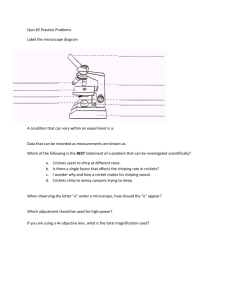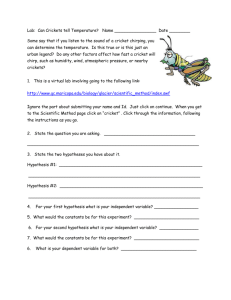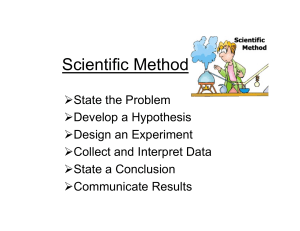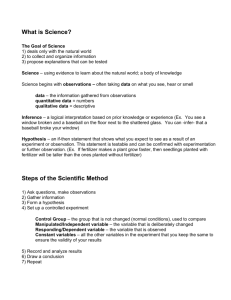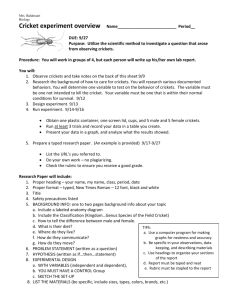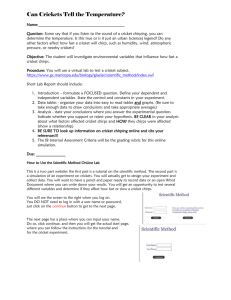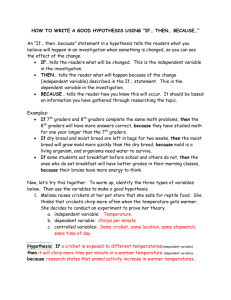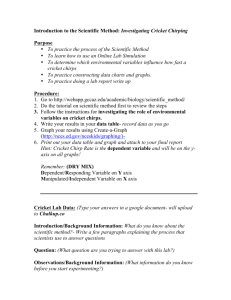Scientific Method
advertisement
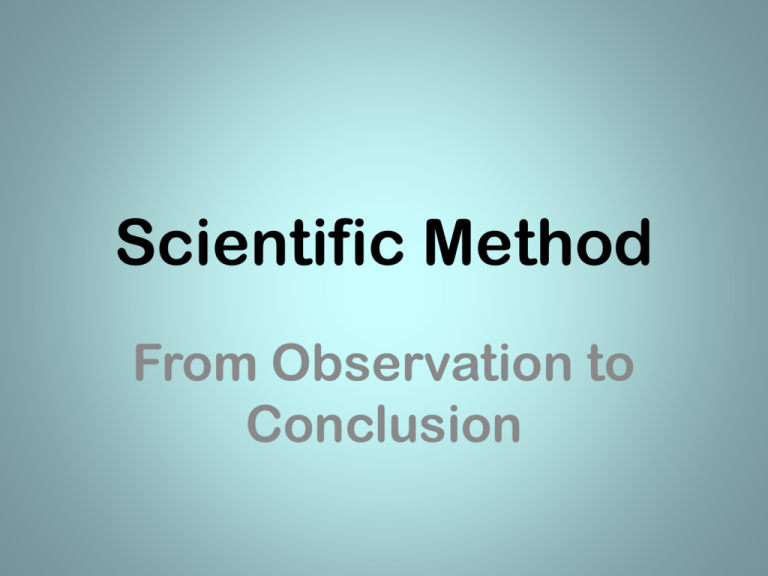
Scientific Method From Observation to Conclusion Step 1: Make An Observation Look at the world around you and use what you know to collect information. Qualitative = Quality Describes our observation using our five senses. Quantitative = Quantity Measureable data from our observation Step 2: Identify the Question Based On Observations A question should be investigable and plausible. A question should lead to an experiment. Step 3: Research Research is important to fully understand the question you are asking and to know what to measure and observe. Step 4: Form a Hypothesis A hypothesis is a predicted explanation for a question based on an observation. It must be testable, provide measurable results, and support or disprove a question. Writing a Hypothesis Often written as a “If… then… because…” Statement Example: If students consume to much sugar, then class productivity will decrease. Because high amounts of sugar can lead to hyperactivity. Step 5: Design an Experiment The process to test the hypothesis by collecting data under controlled conditions. Must have variables: Independent variable: one thing that is being tested or deliberately changed. Dependent variable: measurable results of changing the independent variable. Variables Cont. Control: things that are kept the same in the experiment. Now that we have figured out what we are testing and how we are testing it is time to run our experiment! REMEMBER Change one variable at a time and all experiments must be measurable. Step 6: Collecting & Interpreting Data Now that we have run an experiment and collected observations we must record our findings. Is the data quantitative or qualitative? Tables, Graphs, and Charts Y Axis: Dependent Variable, the thing being measured or observed Growth in cm 10 8 6 4 2 0 A B PLANTS X Axis: Independent Variable, the thing being tested or changed C D Step 7: Conclude and Report Analyze the observations from the experiment and state if the hypothesis was correct or incorrect. Explain why the hypothesis was correct or incorrect. The experiment must be repeatable. The cycle of the scientific method Observe Conclusion Question Data Collection Research Experiment Hypothesis RUN THROUGH AN EXPERIMENT TOGETHER Crickets keep me up! I have crickets in my house, its keeping me up and I need my sleep. I want to observe if I turn off the heat at night if the crickets will stop chirping. Pose a question: Is cricket chirping related to temperature? Hypothesis: Crickets will chirp more when the temperature is high. Design an experiment: • I captured three crickets and I am going separate them into groups of three, put each one in a separate container, and put each container in different temperatures. • Control : use the same kinds of containers, same type of crickets, when I observe and the length of time I observe the crickets. • Independent variable: The temperature changes on the crickets. • Dependent variable: The amount of times the crickets chirp per minute over a half hour at a set temperature. Temperature 15 ⁰ C Illustration from my experiment. 25 ⁰ C 35 ⁰ C Cricket 1 Cricket 2 Cricket 3 Collecting and Interpreting data I created a table to explain what I have collected. However, I want to explain what I have collected to show the difference in the temperature compared to the amount of cricket chirping. Cricket group Temperature ⁰C Amount of chirping in 30 minutes Cricket 1 15 ⁰ C 11 times Cricket 2 25 ⁰ C 24 times Cricket 3 35 ⁰ C 49 times Cricket Chirping after temperature change What does the graph mean? Y axis 60 •The independent variable 50 (X-axis). The temperature change 40 on each set of crickets. 30 •The dependent variable (Y-axis). The amount the crickets chirp over 30 minutes. 20 10 Chirps during 30 min. Cricket 1 15 ⁰ C Cricket 2 Cricket 3 35 ⁰ C 25 ⁰ C X axis Conclusion and Report • Now that you have your data and made the information readable, use the data to confirm or reject your hypothesis. • From the data on the crickets we can conclude that colder temperatures will lower the amount of chirping.
